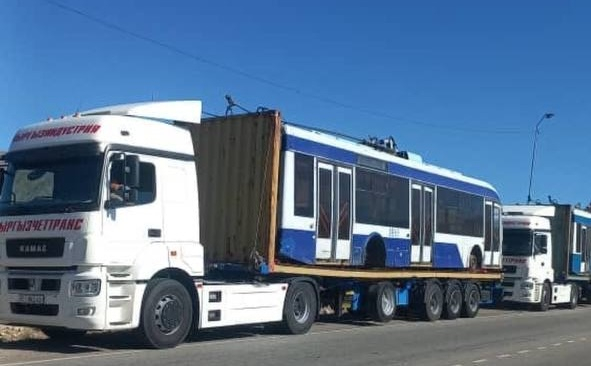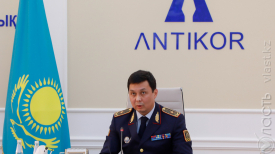- ВКонтакте
- РћРТвЂВВВВВВВВнокласснРСвЂВВВВВВВВРєРСвЂВВВВВВВВ
Home to 1.1 million people, Bishkek is a busy Central Asian city, with frequent traffic jams and one of the worst records in terms of air pollution. When the city administration decided to remove its trolleybus fleet last year, civil society groups protested at length, demanding to get their cleanest form of public transportation back.
Given Kyrgyzstan’s reliance on coal in electricity generation and heating, adding a few new electric buses to the public transport fleet while dismantling the trolleybus network will fail to improve air quality, critics argue. An overall reduction of the public transit fleet will inevitably contribute to traffic congestion and to the depletion of the city’s finances.
The effort to green the city’s public transit had been concrete: Since 2008, the European Bank for Reconstruction and Development sent loans and grants worth over $23 million to the city of Bishkek to upgrade its trolleybus fleet and develop its infrastructure, contributing to the replacement of 80% of the transportation network.
When the city decided to do away with trolleybuses in favor of battery-electric buses (BEBs) last year, the transition was partly supported by a $50 million loan and grant from the Asian Development Bank.
On January 22, Bishkek’s mayor’s office said it paid off the EBRD loan, essentially making the city pay two loans for one mode of public transport since the trolleybuses were halted on November 8.
A Quick Stop
The plan to remove the trolleybuses was announced abruptly last year and the government scrambled to fend off criticism by announcing the delivery of part of the fleet to other large cities across Kyrgyzstan and to reconvert some into electric buses.
The transfer of trolleybuses to the cities of Osh, Naryn, Batken, and possibly to Tokmok, greatly exceeds the local demand and the capacity for local infrastructure to absorb them, leaving some trolleybuses in storage. Critics have called it a distraction for the inadequacy of the whole project.
Efforts to challenge the city’s decision have been met with resistance. Authorities have cracked down on peaceful protests and court appeals.
A Long Route
Trolleybuses have long been integral to Bishkek’s identity. Launched in 1951, the network grew to become one of the twenty largest in the world, peaking at 18 routes and 200 trolleybuses. By November last year, the system operated 11 routes across the city with a fleet of 179 trolleybuses.
Despite routine and major investments, including the EBRD grants and loans, Bishkek pulled its entire trolleybus fleet between June and November last year, replacing it with 120 Chinese-made battery-electric buses (BEBs), a project co-financed by the ADB. The city will spend additional funds to purchase and install new batteries in 42 old trolleybuses.
In 2019, Grütter Consulting, hired by ADB, recommended the adoption of BEBs to replace 25 old trolleybuses along with high-polluting diesel buses. It remains unclear why the entire trolleybus system is being discarded and replaced.
“BEBs are more efficient, lower cost, and more flexible. The same decision has been taken in the last 10 years by numerous cities which had trolleybus systems and where the catenary and transformers had reached the end of their lifetimes,” CEO Jürg Grütter, told Vlast.
According to the UN Economic Commission for Europe, a ride on a trolleybus can cost a city 40% less than an electric bus. Trolleybuses are actively used in over 300 cities, and are seeing major upgrades in Prague, Tallinn, and Vilnius from 2024-2026.
The move to dismantle Bishkek’s trolleybus network appears to violate a 2015 credit agreement for the trolleybuses between the EBRD and the Kyrgyz government. Without the written consent of the EBRD, Bishkek is prohibited from selling or disposing of its trolleybus infrastructure. By paying off the loan, the credit agreement would cease to be binding.
Public Backlash
Public dissatisfaction has been growing since May 2024. Civil society groups have signed petitions, protested, and filed lawsuits against the Bishkek Trolleybus Authority. The petition "Save the Bishkek Trolleybuses" highlights a critical issue: The new electric buses will only cover half of the trolleybus routes, providing no expansion of the public transportation network.
The only political party publicly opposed to the removal of the trolleybuses was the Social Democratic Party (SDK). They were barred from participating in the parliament’s session, where they were set to contest the city’s decision.
The ruling elites have been targeting the SDK for months for their political activity and in November last year their 26-year-old leader Temirlan Sultanbekov was arrested along with fellow party members Irina Karamushkina and Roza Tyurksever and charged with vote-buying.
Sultanbekov has been on hunger strike in prison for over 70 days, and his condition is rapidly worsening, as the Kyrgyz government has refused him any medical care while in prison. The SDK leader’s treatment and arrest has sparked international outcry for human rights violations from the EU parliament, Madrid Club, and Progressive Alliance.
Many residents felt like their voices remained unheard when the mayor’s office chose to dismantle the trolleybus system. Over 1,500 citizens have submitted petitions, in an attempt to reverse the decision. Environmental activists have filed two lawsuits against the Bishkek Trolleybus Authority, accusing it of illegally dismantling public infrastructure.
The Bigger Picture
Bishkek’s public transportation struggles reflect broader issues. The growing city faces severe traffic congestion and air pollution, compounded by ailing infrastructure. As of April 2022, Bishkek had 500,000 registered cars, ten times more than the city’s roads can handle.
Marshrutki, another form of public transportation, were also recently removed from the city, with only a few left. However, Rahat Sabyrbekov, a research fellow at the OSCE Academy in Bishkek and visiting scholar at Harvard University, wasn’t as critical about this decision.
“It wasn’t a bad decision to remove marshrutki. They aren’t safe and they’re highly polluting. However, trolleybuses were removed without much consideration for the consequences. Bishkek is growing, and there’s already too many cars in the city. There’s just not enough buses,” Sabyrbekov told Vlast.
In January, Bishkek mayor Aibek Dzhunushaliev listed his reasons behind removing the trolleybuses, notably that the trolleybus wires were ugly and the inflexible trolleybus routes contributed to traffic jams.
Rada Valentina kyzy, founder of urban initiative Peshcom (from the Russian 'on foot'), remains skeptical even over the performance of the new electric buses. “We need to see how they perform in our conditions and resolve the issue of battery disposal,” she told Radio Azattyk.
Others are concerned over the monopolisation impacts of the new electric buses. Bermet Borubaeva, the founder of the initiative #BishkekSmog described to Vlast how the removal of the trolleybuses may put Bishkek in a precarious position.
“With Bishkek’s trolleybus infrastructure, we could purchase a range of trolleybuses from Belarus, Russia, or China to be used throughout the city. However, the new battery charging stations are specific to Ankai (the bus manufacturer - V.), so if we expand, or need renovations we can only purchase from Ankai.”
Andrew Gundal is a contributing writer on Central Asian affairs.
Поддержите журналистику, которой доверяют.












